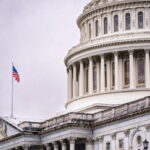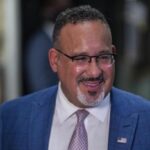President Joe Biden’s plan to magically wipe away portions of legitimately incurred student-loan debt is, in certain ways, a perfect encapsulation of his administration’s awful policymaking.
It provides the wrong incentives — moral, economic and political. It abuses executive power. It spends a fortune, yet still not enough to satisfy his party’s progressive base. And it does nothing to get to the root of the problem: overpriced higher education.
The decision, announced Wednesday, is reportedly to eliminate $10,000 in debt for borrowers who make less than $125,000 (and up to $20,000 for Pell Grant recipients). Biden’s been pressured to cancel all student debt; to his credit, he has so far resisted. But it will still cost billions, and Biden reportedly is leaving the door open to further cancellation by irresponsibly refusing to restart repayments that were paused during the pandemic.
In keeping with my campaign promise, my Administration is announcing a plan to give working and middle class families breathing room as they prepare to resume federal student loan payments in January 2023.
I'll have more details this afternoon. pic.twitter.com/kuZNqoMe4I
— President Biden (@POTUS) August 24, 2022
Let’s be clear about what’s happening here: Working-class people will be taxed to fund a benefit for people whose degrees already give them a leg up in the economy. The very families whom “Middle Class Joe” says he worries about struggling with bills at the kitchen table will subsidize the advanced degrees of lawyers, bankers and other white-collar professions. Future generations will bear more federal debt because millions in this one were absolved of their obligations.
Never again should Democrats accuse conservatives of taxing the poor to help the rich. Biden is actually doing it — and he’ll indirectly turn more spending loose in an already inflationary economy.
Also punished by this terrible idea are people who did things the right way. You know: suckers.
If you paid back loans or never incurred them because you sought out cheaper alternatives, your reward is to help people who didn’t think twice about borrowing tens of thousands of dollars to get an English degree.
The Biden policy will encourage, not deter, irresponsible spending in higher education and foolish debt for students. It’s an iron economic law that if you subsidize something, you get more of it. So, get ready for even higher tuition and more administrative spending.
Colleges and universities face no pressure to reform if they can convince young borrowers: Don’t worry, it’s funny money that the government will pay for eventually. Why would any kid take the sober but perhaps less-satisfying step of getting basic credits for cheap at a community college when taxpayers will pay for the full four-year ride?
Biden’s decision to extend the moratorium on payments is indefensible. His administration tries to persuade us that the economic bruises we’re all carrying aren’t real. It redefined recession, celebrated gas-price reductions that still leave us paying at least 50% more than when the president took office and manipulated statistics to suggest inflation is zero. On COVID-19, public health officials just announced what most of us have known for more than a year, that we have to learn to live with it.
And yet, on this one issue, the administration wants you to believe that the economic harm of the pandemic is still so bad that not a single borrower can be forced to make a payment on any student loan.
To do all this, the people who constantly tut-tut about the specter of authoritarianism and threats to our democratic norms are creating a benefit without so much as a nod at Congress. The imperial sweep of such policymaking is much more troublesome for the republic than a few oddballs in red hats showing up at school board meetings.
There is a legitimate public policy issue to be addressed. We don’t want huge numbers of people inhibited in building wealth because they were led into bad decisions when they were young. In Texas, in the 2019-20 academic year, more than a third of students carried debt. A typical bachelor’s degree candidate had more than $23,000 to pay off.
Too many more were sold a bill of goods, encouraged to borrow money to pursue a degree they never attained.
But there are better ways. First, we have a longstanding legal remedy for people who cannot repay their debts: bankruptcy. It’s not as pleasant as having the president, like a game show host, reveal the big prize. But it’s a responsible system that provides for a fresh start.
Most student debt cannot be discharged in bankruptcy, however. That’s a dumb policy that Congress could address.
Or if there’s going to be widespread loan forgiveness, we should get more out of it. Expand programs to exchange debt relief for public service, such as years spent teaching in needy schools, working as a doctor or nurse in a rural community or providing legal assistance to the poor.
Otherwise, where will it end? Should the government pay off car loans or mortgages? What about business loans?
Come to think of it, though, we’d be much better off if we gave young people money to buy a truck and plumbing or lawn equipment than to spend three hours a week learning Jane Austen.
©2022 Fort Worth Star-Telegram. Visit star-telegram.com. Distributed by Tribune Content Agency, LLC.
—-
This content is published through a licensing agreement with Acquire Media using its NewsEdge technology.



















Funny thing, the workers being asked to foot the bill are making no where near the $125,000.00 a year threshhold. The elites enjoying the benefits at the expense of the laborers, how like the Democrats; it could be construed as a form of slavery in the modern world!
Exactly. 60% OR MORE Of those college degrees, will land those who have them, 125k and HIGHER wages, in 5-10 years after getting the job. WHILE FOLKS LIKE US who didn’t GO to college, and went right INTO the work force (OR like me joined the military), would have to work 3-4 years, to evne SEE 125k…
YET ITS US tax slaves, who have to once again, FOOT THE BILL< to bail out the rich..
This will NEVER END! Just wait until ALL OF THE little snowflakes take a SERIOUS HIT to their credit ratings for this little windfall!! Wait for it!
THEY ALL SHOULD. BUT you can bet, that somewhere IN that bill he signed, WAS a loophole or the like, saying that these snowflakes WON’T have their credit history dinged.
AND IF THERE IS YOU can bet the left will demand THAT GET CORRECTED too.
Of course they will.
Just like Obamacare: Congress, most notably Wicked Witch of the Left Peloski after saying we had to pass the bill before we could know what was in it, found out she should have read it! While assuring the Press and Public not to worry for them, that Congress had their own Medical Coverage, a Cadillac Plan for sure, once the bill was passed, they discovered wording in it that said Congress was also required to sign up for it.
Imagine that.
Of course, in a series of rushed sessions, Congress voted in an amendment that reversed that requirement, leaving Congress to keep their Cadillac Health Plan, except for a group of Republicans who had already signed on to the new so-called Affordable Health Care in solidarity with their constituents.
Remember that?
Congress must not, because most of them still pass many bills without reading them first. And those who do read them first, always find things that are dubious or worse.
That’s why i honestly believe our founders BUGGERED UP royally by NOT MAKING IT LAW< that before ANY bill can even be debated, EVERYONE WHO IS TO VOTE ON IT, must sign an affidavit that they HAVE READ IT.. AND ANYONE CAUGHT Falsifying that affidavit, AUTOMATICALLY should lose their seat.
I think about all the college freshmen and their parents who just laid down their first payment on a $60,000, $70,000 and up, way up, year of tuition and wonder what they are thinking. Of course, I wondered what they were thinking just sending their kid off to a communist education factory even before this happened.
What’s wrong with people???
Never in the course of human political history has one man or one political party been able to redistribute and steal so many millions of dollars from opposing-party people and non-party people into the hands of the party of people who buy other people’s votes with just the stoke of a pen, and no legislative approval. He who would steal a little to get richer has now empowered himself and his party to steal a lot. There really should be no surprise that the head of an American crime family would do such an act. The surprise is he ever got elected and was given the power. About 100 million don’t believe he actually was elected. Just goes to prove The January 6th committee is investigating the wrong person and the wrong family. Let those who have ears to hear, hear and the eyes to see, see.
What’s wrong? E VERYTHING..
ore and more it seems like being a LAWFUL and gainfully employed american is turning out to be the SUCKER IN SOCIETY, while the dregs are the ones constantly being rewarded by those in power.
Hard working, freedom loving taxpayers being milked dry to fund the elitist Socialist Progressive agenda to create a new appreciative and loyal submissive sycophant and obsessively devoted entitled tsitizenry obligated to the State, not the State obligated to represent those who voted them into office.
It can still be stopped, but if the so-called Conservatives refuse to step up and really take charge when they have an advantage, then it truly is just a matter of time before the greatest experiment in representative government falls to the sheer weight of the Left’s relentless march toward anarchy and a new world order forged in their megalomaniac image.
It makes my hands sweat.
it makes my head hurt.
Why would anyone who has college loan debt after Joes give away pay any money to their loans anymore? When new students take out loans in the future pay for any of theirs. Seems if you just wait long enough the dems will pay it for you. So, if you pay, you are an idiot! Why do you think college loans in default have gone up so much in the few years is because the dems have been saying they will pay it for you. Few years ago it was $600 bil, now $1.5 trillion. Nw that they have shown they can just sign some exec order just wait it out. Just like illegals. Why would they do anything when the dems at some point will just make the, legal.
Great job libs!!
Exactly. ALL THIS IS doing, is telling these snowflakes, it MATTERS NOT, what loans you take out, what contracts you sign. DON’T PAY ONE DIME< and just whine long and loud enough, and Unca govt will take care of it for you…
JUST WAIT TO see what, happens if/when they decide to get loans for a car or home, AND DON"T PAY THAT BILL!!!!
The treachery of the treasonous, socialist Democrat Party know no bounds.
This treasonous socialist Democrat Party is just trying to buy votes just before the November elections.
This Treasonous, dishonest, destructive, Socialist Democrat Party’s objective is to deliberately lie, cheat and manipulate elections in order to take total control of the American people, by restricting U.S. oil production, increase Taxes and the cost of everything and bring American commerce and economy to its knees and to promote Socialism.
Then access power and retain it by any means available –
no matter the costs to the people, the government or the nation.
This treasonous, hateful, destructive, immoral, socialist Democrat Party and their corrupt, demented puppet president has become our country’s most destructive and deadliest ENEMY!
I have a friend who lost both legs fighting to keep our nation a Republic. He got a free education and a well-paying job after graduation.
Don’t ask about what he thinks of Biden’s and the Democrats vote buying scheme. His reply could never be printed here.
I actually feel sorry for those whose loan debt is being forgiven – look at it this way, your vote is being bought for 10K or 20K cause they expect you to vote for them as payback knowing that if you do, they have you in their backpocket for future needs.
So go ahead and keep believing they are doing you a favor but the payback will end up costing you your integrity.
Since most probably already GREW UP IN THE DEMOCRAT Plantation, they are imo, too BRAINWASHED INTO being life long dimbocracks..